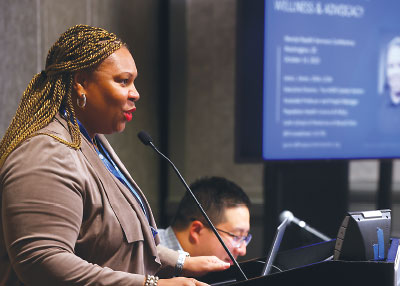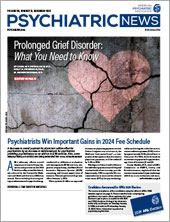“What is a real friend?” Howard Liu, M.D., chair of psychiatry at the University of Nebraska Medical Center, asked an audience gathered at the Mental Health Services Conference in October for a session on problematic social media use by youth.
Friendships today take many forms, with some friendships formed without ever meeting in person, he noted. These virtual friendships can be healthy, but it’s also healthy to ask kids who they are communicating with on a regular basis.
Liu, who is a father of four and a child and adolescent psychiatrist, said that talking to young people about their safety and privacy online is paramount.
From the clinical perspective, Liu suggested eight topics that psychiatrists or mental health professionals should broach with young patients:
•
What are your favorite apps?
•
What are your online sources of information?
•
Does your family have any screen time rules?
•
Do you have any online boundaries you set for yourself?
•
Do you have online friends?
•
Do you engage in online relationship activities (for example, sexting)?
•
Have you ever experienced cyberbullying?
•
Is your sleep being impacted by online activities like social media or gaming?
About a third of teens report waking up at least once a night to check their smartphone, according to a
survey by Common Sense Media; 29% sleep with their phone in bed.
Poor sleep is not the only potential harm, Liu said. As noted in the U.S. surgeon general’s 2023 advisory titled “Social Media and Youth Mental Health,” excess social media use is associated with depression, poor body image, and disordered eating.
Youth who engage in problematic social media use may need support from professionals, said Lena Green, D.S.W., L.C.S.W., executive director of the HOPE Center. She offered an overview of how her team offers this type of support at the HOPE Center, a community mental health clinic that serves teens and adults in Harlem, N.Y.
The center features a youth resilience program called Thrive; one component of the program addresses digital wellness, Green explained. “We call it the four ‘Ds’ of digital wellness: detox, de-stress, distract, and discover,” Green said.
•
Detox: Teens learn to gradually wean themselves off their devices. Green said starting slow is important; teens are asked to start by removing unused apps and/or moving their device to a separate room at night. The teens are next asked to take “digital timeouts,” starting with short durations away from their devices.
•
De-stress: Trying to break a habit can be stressful, so teens discuss ways to relieve this stress with simple interventions like warm showers or aromatherapy. Instead of chatting or posting content online, teens are encouraged to write their feelings on paper rather than online to vent brimming emotions.
•
Distract: Teens are encouraged to identify new activities to keep them occupied during their digital timeout periods. These include long walks, seeing a movie, or planning a family vacation. Green noted that one of Thrive’s favorite activities is having the teens pick 10 songs that they connect with and make an album of their life.
•
Discover: Teens are asked to perform small acts of kindness, such as paying for someone’s coffee or writing a thoughtful letter to a friend. This activity is meant to guide the teens to finding joy and purpose in the real world.
Green noted that the goal of digital detox is not eliminating or even severely curtailing social media use, but rather to remove the teens’ preoccupation with social media. She noted that today’s teens can benefit from social media’s ability to build communities and offer feedback, advice, or validation, if the platforms are used in a healthy manner.
Understanding how youth use social media doesn’t require you to be an expert, Liu emphasized. “Don’t fake it—the kids will know. Just be curious,” he said.
He encouraged psychiatrists to maintain a professional social media profile so that patients can learn more about them. ■

